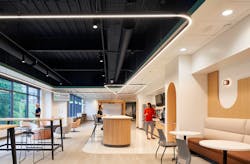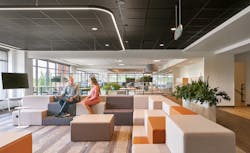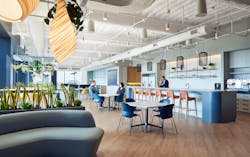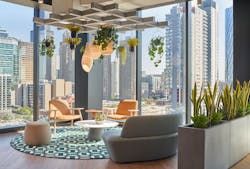How the Workplace Can Holistically Evolve to Support Employees
Corporate workers have been through a lot in the last two years. From fighting off a deadly virus to witnessing a wave of social injustice and living through historic levels of political turmoil, the people who left the office in March of 2020 have been irrevocably changed by their experiences. Given the trauma, stress and major life shifts they’ve dealt with, it’s not surprising that so many employers are being met with resistance upon announcing a return to the office.
Employees did their part: they proved to their companies that they could be productive and effective working remotely through chaos, and now that they have grown through that adversity, they are looking to their employers to give them something new. After two years of figuring out new and innovative ways to work, employees are now finding it difficult to achieve their full potential in a space that is frozen in time.
But what if the workplace became a tool for helping to close the gap between what employees are currently doing and what they are capable of doing? What if the office could be used to enable workers to become their best selves–both in and out of the workplace?
Aristotle spoke of Eudaimonia (also spelled Eudaemonia), the happiness and contentment that comes with fully living up to one’s potential. I believe that companies looking to bring people back into the office are going to need to create eudaimonic office spaces, which offer employees a place where they can get their work and personal lives in order, thus becoming the best, most productive versions of themselves inside and outside of work.
To do that, we need to focus on four key areas:
Learning + Development
This area is crucial to the future of our species as we come up against artificial intelligence, robots and machine learning. I have worked with enough firms in the tech sector to see that, in the next few decades, a large chunk of our white-collar jobs will be obsolete. Every company is going to need to create new departments and grow new skill sets–so we might as well start internally.
Imagination
Over the last 40 years, a company’s stock price has moved from being mostly a reflection of its “book value” to now being mostly driven by “intangible value” that is not reflected in their books. Stocks are now being traded at a value based on the market’s perception of a firm’s future success–think Tesla!
We are in an age of workplace innovation, where it is more important than ever for companies to create spaces that spark curiosity, drive creativity and enhance employees’ ability to innovate. Many companies have done just that, creating tinker spaces that enable employees take things apart, build new ideas and prototype solutions. This gives employees a chance to break outside of the redundancy of work and expand their imaginations, which is essential to driving company innovation.
Community
Companies have been taking notice, trying fun events like farmer’s markets, foam latte art classes, food truck visits, gallery showings, heritage month celebrations and special holiday parties. There have even been new considerations for supporting working parents with family picnics and monthly events like carnivals with bouncy houses and games.
I say, take it a step further! Most parents feel like they must choose between being a good parent and being a good employee. We lost 863,000 moms and 168,000 dads from the workforce during COVID because they were unable to parent and work at the same time. What if the workplace built playgrounds for afternoon playdates? How many parents would be willing to come back to a workplace that didn’t ignore the fact that they had kids but embraced it? How much longer do you think an employee would stay at a job if they not only had a friend at work, but their kids were also friends?
Health
But it doesn’t have to be this way. Imagine a workplace where you could go and truly feel supported emotionally, financially, medically, etc. Some good ideas to promote this feeling include:
- Many firms have been adding financial advisors on site to alleviate money challenges families have faced.
- Physical health is a huge factor that has suffered since being forced to remain sitting all day on video calls. Giving employees a space where they can move around freely or adding a workout space with trainers to help motivate a healthier lifestyle.
- Mental health has been one of the biggest issues employees have suffered with, and there has not been much done about it. I believe every company should look to add therapists to their spaces.
- In considering the neurodiverse, firms should include sensory deprivation areas where people can escape from an overstimulating environment. Give employees more control in choosing the space that best fits the emotions they are feeling that day. What if you could choose an area that depicted how you wanted to interact that day? A person in need of quiet for heads-down work could retreat to a space without distraction, while someone suffering from social isolation could sit in a common area with their peers and colleagues.
Employers that take a closer look at these four key areas of their workplaces and identify what changes really need to happen, will not only be better positioned to entice people back into the office, but will also offer employees a space where they can become their best selves both personally and professionally.
About the Author
Regan Donoghue
Regan Donoghue is a Senior Principal at Unispace, a global strategy, design and construction firm. A seasoned strategist with more than 15 years of experience, Regan helps clients challenged by complexities that arise in the world of workforce and workplace strategy. She takes on more turbulent paths, and specializes in guiding clients through scenario planning, designing change plans, and developing predictions on the future of workplace. As a WELL & LEED Accredited Professional, she helps guide the best solutions that support employee mental, physical and emotional well-being at work.



